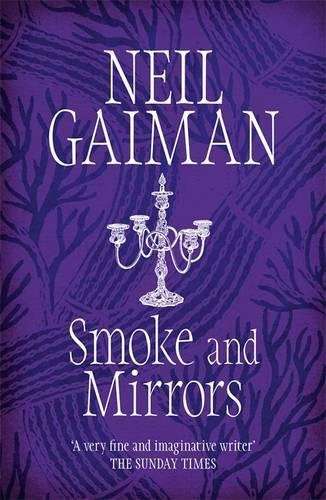
('Find it Fast' © Thomas Hawk, 2010)
*
A KIND OF MAGIC
by JACQUELINE SAVILLE
*
A short story properly told can work magic. Think about it: in the space of a couple of thousand words, a few pages of a paperback, a skilful author can take you inside someone else’s world and life, show you around, and sometimes – if you’re lucky – leave you with a lasting souvenir. Something that makes you smile or shiver years after you read their words. An afterimage burned onto your imagination.
Neil Gaiman is a skilful author, this is widely acknowledged, but mainly in terms of his longer, more immersive works, such as the Sandman series or American Gods. Imagine if he could condense all that story-telling magic so that you could read it in less time than it takes you to sip your way through a cup of tea. Let me introduce you to ‘Chivalry’ and ‘We Can Get Them For You Wholesale’, both from the 1999 collection Smoke and Mirrors.
A kind of Yin and Yang of comic fantasy, these two stories make a striking light and dark pair. Both seemingly ordinary tales of ordinary people, each hinging on one out of place fact – swallow that, and all the rest falls out naturally.  ‘Chivalry’ with its happy ending leaves a warm glow and restored faith in humanity, while ‘We Can Get Them For You Wholesale’ is something of a cautionary tale, its legacy an icy finger down your spine.
‘Chivalry’ with its happy ending leaves a warm glow and restored faith in humanity, while ‘We Can Get Them For You Wholesale’ is something of a cautionary tale, its legacy an icy finger down your spine.
Neither ‘Chivalry’ nor ‘We Can Get Them For You Wholesale’ is belly-laugh funny. There is no written equivalent of mugging to camera, no hey guys have you noticed I’m talking about some zany goings-on here. And therein lies their power. Each occurrence is described as naturally as the next, as though each one is as everyday as the next, and it’s that quiet understatement that draws you in.
Let’s start with a closer look at ‘Chivalry’. Briefly, it is the tale of an old lady who finds the Holy Grail and thinks it looks nice on her mantelpiece. She is visited several times by Galaad, Knight of the Table Round, who first offers to buy the grail then tries to persuade her to exchange it for other magical artefacts. When he eventually does, it’s because of what they’ll look like on the mantelpiece, not because of their magical properties – which the old lady seems uninterested in.
The Arthurian legends are the pinnacle of romance and bravery, all those noble knights and heroic deeds. Not to mention magic swords. They’ve been pillaged for fantasy stories many times, from the stuffy re-workings that play it straight to futuristic culture-clashes and a variety of comedic approaches. Somehow Gaiman manages to make ‘Chivalry’ feel fresh and different, right from that matter-of-fact first line: ‘Mrs Whitaker found the Holy Grail; it was under a fur coat.’ From that alone it’s hard to tell where the story’s heading, but you do get a big hint that it’s not going to be wholly serious.
After that neat first line, we discover that Mrs Whitaker is in an Oxfam shop, looking for a cut-price treat on the way home from collecting her pension. We are never told how this suburban English widow recognises the metal goblet for what it is, nor why it should have turned up in a charity shop, but this is the one out-of-place fact that the story hinges on. If we accept from the start that it’s there and she spots it, everything else makes perfect sense.
Part of what makes the story so delightful is its domesticity. The same emphasis is placed on Mrs Whitaker’s purchase of some liver, and the delicious meal she makes from it later, as on her discovery and purchase of the Holy Grail. When she gets her goblet home she carefully washes out the brownish-red dust, even though she knows this is the Holy Grail, so that it’s nice and clean for display. When the knight appears at her door, her first reaction is to ask for ID – which as an old lady she’s forever being reminded to do before she lets anyone into the house – and the fact that he does indeed have a scroll bearing a drawing of himself and signed by King Arthur is a magnificent detail. As is the way Mrs Whitaker puts him to work on subsequent visits, helping her in the house and garden with tasks a strapping young man can handle much better than a pensioner. She does at least make him some sandwiches for the journey home.
“I’m glad you’re here,” she said. “I’ve got some cases that need moving.”
She showed him up to the boxroom in the top of the house. He moved all the old suitcases for her, so she could get to the cupboard at the back.
It was very dusty up there.
She kept him up there most of the afternoon, moving things around while she dusted.
Galaad had a cut on his cheek, and he held one arm a little stiffly.
 The entire episode seems to underline how settled and content Mrs Whitaker is in her life, striving only to supply the necessary amounts of tea and cake to friends and family, and to fill that space on the mantelpiece with a suitable ornament.
The entire episode seems to underline how settled and content Mrs Whitaker is in her life, striving only to supply the necessary amounts of tea and cake to friends and family, and to fill that space on the mantelpiece with a suitable ornament.
All the dusting, tidying, weeding and baking that are interlaced with the more unusual aspects of the story, and the scattered references to her late husband, emphasise how home and family are the focus of her world, the things she keeps coming back to. We get the impression she doesn’t like anything to disrupt that; she even tells Galaad off for putting his cup and saucer on the carpet when you might expect her to be in awe of one of King Arthur’s legendary knights. The grail itself seems to have no significance for her beyond the aesthetic, she turns down Galaad’s offer to buy it and refuses a variety of powerful items offered in exchange as unsuitable. It’s the end of the story, however, that hints most strongly at her desire to remain as she is. In the Oxfam shop where she’d found the grail, Mrs Whitaker finds a ‘tarnished old silver container with a long spout’. She takes it to the till:
“Sixty-five pee, dear,” said the woman, picking up the silver object, staring at it. “Funny old thing, isn’t it? Came in this morning.” It had writing carved along the side in blocky old Chinese characters and an elegant arching handle. “Some kind of oil can, I suppose.”
“No, it’s not an oil can,” said Mrs Whitaker, who knew exactly what it was. “It’s a lamp.”
The implication here is that it contains a genie, ready to grant Mrs Whitaker’s wishes. Still, she doesn’t buy it:
She paid her five pence for the novel, and put the lamp back where she had found it, in the back of the shop. After all, Mrs Whitaker reflected, as she walked home, it wasn’t as if she had anywhere to put it.
In ‘We Can Get Them For You Wholesale’, Peter Pinter is a dull everyman who likes a bargain. One Friday afternoon he gets suspicious about his fiancée, Gwendolyn, and Archie from accounts, and after a sleepless night decides the solution is to have Archie bumped off. His only resource in these pre-internet days is the Yellow Pages. Both the reader and Peter know that, realistically, hitmen are not listed there, and once he fails to find one he’ll calm down and dismiss the idea. Naturally, the out-of-place fact that this story hinges on is the cryptic listing under pest control that suggests both Peter and the reader were wrong.
ASSASSINS, he found, was not between ASPHALT CONTRACTORS and ASSESSORS (QUANTITY); KILLERS was not between KENNELS and KINDERGARTENS […] being of a careful nature, he dutifully inspected the entries in [pest control], and at the bottom of the second page, in small print, he found a firm that looked promising.
‘Complete discreet disposal of irksome and unwanted mammals, etc.’ went the entry, ‘Ketch, Hare, Burke and Ketch. The Old Firm.’ It went on to give no address, but only a telephone number.
Beyond that, the escalation of the story flows logically from Peter’s inability to resist multi-buy offers. As soon as wholesale rates are mentioned, you know roughly where things are going to end up.
In this story it’s the business details that are sublime. Peter nervously phones Ketch, Hare, Burke and Ketch and is greeted by a polite and helpful secretary – who calls him ‘Sir’ even when he asks if their pest control business covers people, and checks that he has pen and paper to hand before telling him where the clandestine meeting with ‘our operative’ will be. To her, and to the brisk salesman who duly meets Peter, this is unremarkable, an ordinary part of their job, and it’s those mundane details carried over from other contexts that Gaiman uses to great effect here.
The two-for-one offer, and all subsequent discounts, could refer to tins of beans, or Leylandii at the local garden centre, rather than the cost of having someone killed. When Peter starts drawing up lists of potential hits, determined to get his money’s worth, he could just as easily be mulling over recipients of wedding invitations or Christmas cards. Everything about the bargain hunter getting caught up too enthusiastically by a special offer rings so true, including the eventual repentance and wondering if it’s too late to cancel the order.
As a writer, very few pieces of my published work are comic fantasy, which is testament to how hard it is to make a story in that genre work. These two Neil Gaiman stories are great examples of how to do it well. The detail of the everyday backdrop makes each story feel grounded in reality, and there’s an emphasis on how mundane it all is – pension day, gardening, an imagined infidelity, the Yellow Pages – then the whole situation and, more importantly, the reader’s expectations get flipped by the introduction of one piece of weird. It’s that juxtaposition of normal and outlandish, the strong contrast between character and situation, that creates the interest and the humour. I continue to do my best to write dull characters, and every so often I come back to these stories and remind myself that it is possible to turn them into story-telling gold.
~
 Jacqueline Saville lives in West Yorkshire, and reads when she isn’t writing. Her short stories, flash and micro fiction have been published in various print and online magazines, including comic fantasy in Bards and Sages Quarterly. You can find her on Twitter @JYSaville or visit her blog thousandmonkeys.wordpress.com where there are links to most of her work.
Jacqueline Saville lives in West Yorkshire, and reads when she isn’t writing. Her short stories, flash and micro fiction have been published in various print and online magazines, including comic fantasy in Bards and Sages Quarterly. You can find her on Twitter @JYSaville or visit her blog thousandmonkeys.wordpress.com where there are links to most of her work.
~
photo of Neil Gaiman © Kyle Cassidy


One thought on “A Kind of Magic”
Comments are closed.